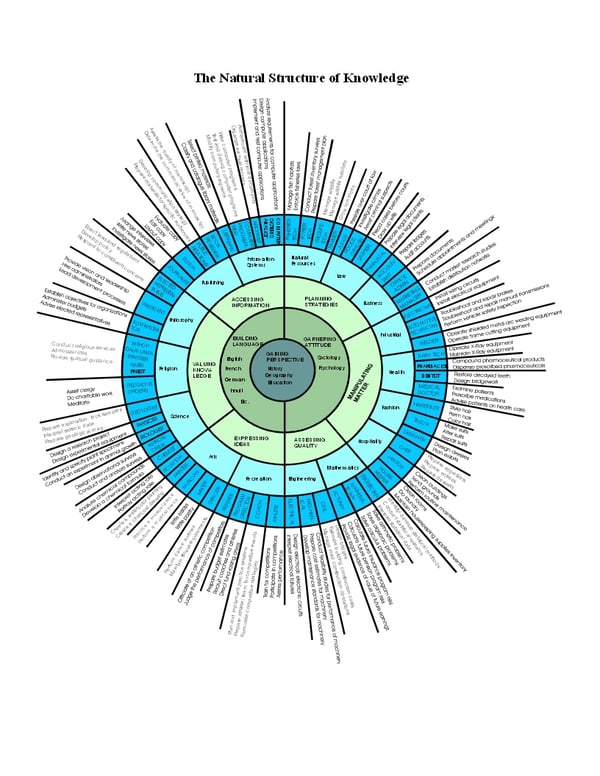Published on
Education For Innovation

Innovators have to be able to manage knowledge effectively. It is generally accepted that this must be done in an active learning environment that provides realistic conditions for innovation to take place. Trial and error are essential to innovation. Problems are seen as a positive part of the process.
Innovators are practical people that have the ability to turn knowledge into action and develop the confidence required to set goals and overcome obstacles to achieve them. Innovators must also be able to create and recreate the paths that they are going to follow as they reach their goals.
Conventional education focuses on accumulating knowledge. If we are going to entrench innovation capability in learners through education, we have to change the focus of education from accumulating knowledge to managing knowledge.
Managing knowledge requires a structure because we need to be able to determine our accomplishments both qualitatively (big picture) and quantitatively. I believe that knowledge has a natural structure based on the way our brains manage knowledge. It is a cycle of five levels.
- Initial Learning
- Using Knowledge
- Organizing Knowledge
- Personalizing Knowledge
- Styles of Knowledge
Each level of the cycle is also a “process” cycle of nine elements.
- Accessing Information
- Valuing Knowledge
- Expressing Ideas
- Building Language
- Gaining Perspective
- Garnering Attitude
- Planning Strategies
- Manipulating Resources
- Assessing Quality
The most general level of managing knowledge is “knowledge styles”. At this level, the nine processes define our competence in using knowledge. The more we develop knowledge styles the more effective and efficient knowledge managers we become.
Styles can be subdivided into sectors to form the personalizing knowledge level of the cycle. This is where we determine what general areas of knowledge we want to build on. The sectors for each style of knowledge are as follows:
Accessing Information – Publishing and Information Technology Sectors
Valuing Knowledge – Religion, Philosophy and Science Sectors
Expressing Ideas – Arts and Recreation Sectors
Building Language – Language Sectors (French, English, Spanish, Chinese, etcetera)
Gaining Perspective – History, Geography and Education Sectors
Garnering Attitude – Psychology and Sociology Sectors
Planning Strategies – Natural Resources, Business and Law Sectors
Manipulating Resources – Industrial, Fashion, Housekeeping and Health Care Sectors
Assessing Quality – Mathematics and Engineering Sectors
Sectors are divided into specializations that form our occupations, professions and disciplines, as well as hobbies and life skills. This is the level at which we organize knowledge.
Specializations are divided into the services. This is the level at which we use knowledge to provide services for ourselves and for others.
Services are divided into stages of development. This is the level at which we perform specific applications of services. This is the learning level because we are always trying to improve on what we do. Every time we apply a service in a different situation, the parameters change, so there is always new learning. This is the level at which most people manage knowledge on a daily basis. Consequently, we see knowledge as very complex because applications generate fine details. It is tantamount to how many ways can you organize all the words in the Dictionary. It is the reason why we cannot create a model for accumulating knowledge.
There was a time when the accumulation of knowledge was necessary because there was limited access to it. This was when all the conventional ideas we have about knowledge were formed. Today we have unlimited access to knowledge, but we are still locked into those old ideas. As well, knowledge is proliferating and changing so quickly that accumulation alone does not make sense any more.
We need to change to an education system that encourages proliferation of innovation and change. We need to see information as the raw material for knowledge management. We need to see the nine processes at the five different levels of knowledge as the tools for knowledge management. We need to teach the structure of knowledge and the process of learning from this perspective. It is not that we will not accumulate knowledge. We will actually accumulate knowledge better than we ever did before.
We will create a total shift in the culture of education, a culture that embodies innovation and economic development throughout the world. We shall consider that all minds are essentially equal when it comes to using knowledge. We just like to do different things. But it doesn’t matter what styles of knowledge we build for ourselves, we can all be innovators in what we do. Motivation will be intrinsic in an education system based on managing knowledge. Less people will fall through the cracks and more human potential will be harnessed.
Author Perspective: Business



